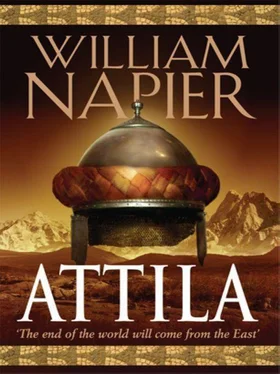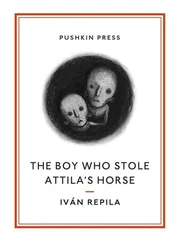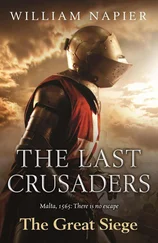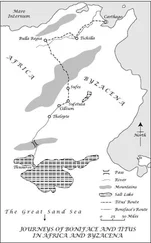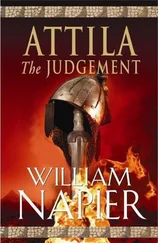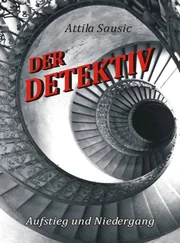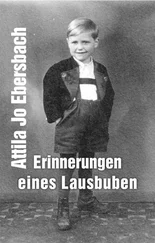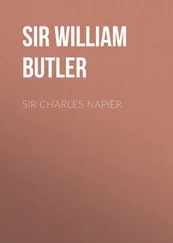William Napier - Attila
Здесь есть возможность читать онлайн «William Napier - Attila» весь текст электронной книги совершенно бесплатно (целиком полную версию без сокращений). В некоторых случаях можно слушать аудио, скачать через торрент в формате fb2 и присутствует краткое содержание. Жанр: Исторические приключения, на английском языке. Описание произведения, (предисловие) а так же отзывы посетителей доступны на портале библиотеки ЛибКат.
- Название:Attila
- Автор:
- Жанр:
- Год:неизвестен
- ISBN:нет данных
- Рейтинг книги:5 / 5. Голосов: 1
-
Избранное:Добавить в избранное
- Отзывы:
-
Ваша оценка:
- 100
- 1
- 2
- 3
- 4
- 5
Attila: краткое содержание, описание и аннотация
Предлагаем к чтению аннотацию, описание, краткое содержание или предисловие (зависит от того, что написал сам автор книги «Attila»). Если вы не нашли необходимую информацию о книге — напишите в комментариях, мы постараемся отыскать её.
Attila — читать онлайн бесплатно полную книгу (весь текст) целиком
Ниже представлен текст книги, разбитый по страницам. Система сохранения места последней прочитанной страницы, позволяет с удобством читать онлайн бесплатно книгу «Attila», без необходимости каждый раз заново искать на чём Вы остановились. Поставьте закладку, и сможете в любой момент перейти на страницу, на которой закончили чтение.
Интервал:
Закладка:
Serena halted at the door to the boy’s chamber and turned him gently but firmly to face her.
‘The knife,’ she said.
‘I – I dropped it somewhere.’
‘Look at me. Look at me.’
He glanced up into those penetrating dark eyes and then looked down again. ‘I need it,’ he said miserably.
‘No you don’t. Give it to me.’
With great reluctance, he handed it over.
‘And promise me you will do no more damage in the palace.’
He thought about it and said nothing.
She continued to fix him with her dark eyes. ‘Swear it.’
Very slowly, he swore it.
‘I am trusting you,’ said Serena. ‘Remember that. Now go to bed.’ She pushed him gently into his chamber, pulled the door shut behind him, and turned away. ‘Little wolf-cub,’ she murmured to herself with the trace of a smile as she went.
One of the palace eunuchs came to Galla’s door and knocked. She nodded for him to be admitted.
It was the sharp-witted, sardonic Eutropius. His vital intelligence was that Serena and Attila had been seen outside the boy’s chamber, making what appeared to be a mutual promise or pact.
When he was gone, the princess rose and strode restlessly around the room, imagining conspiracies and secret conversations everywhere. She pictured the Huns in secret negotiation with Stilicho, of the boy somehow passing messages from Stilicho and Serena to his own murderous people encamped far out on the wild Scythian plains. Or even to his grandfather, Uldin, who, mistakenly in her opinion, would take part in the imperial triumph tomorrow, alongside Stilicho – as if the equal of a Roman general!
She saw too her brother, Emperor Honorius, ruler of the Western Empire, back in his palace in Mediolanum, or hiding away in his new palace at Ravenna, safe behind the mosquito-ridden marshes, giggling to himself as he fed grains of the finest wheat to his pet poultry. Honorius, her idiot brother, two years her junior: the eighteen-year-old Ruler of the World. ‘The Emperor of Chickens’, malicious tongues at court had christened him. Galla Placidia knew it all, both from her network of informants and from her own piercing green eyes, which saw through everything and everyone.
Let Honorius stay in his new palace: it was better, perhaps, that he was kept out of the way. Ravenna, that strange dream-city, connected symbolically to the rest of Italy only by a narrow stone causeway across the marshes. Ravenna, with its night air filled with the croaking of frogs; where, they said, wine was more plentiful than drinking water. Let the emperor stay there. He would be safe and quiet, alone with his chickens.
She stood late into the night looking out onto the Great Courtyard, listening to the peaceful splashing of the Dolphin Fountain, and knew that sleep would not come. If she laid down her humming head now, she would only dream of ten thousand thunderous hooves, of painted barbarian faces, blue and scarred with the scars and burns that those terrible people gave their children in infancy. She would dream of a black, unending rain of arrows, of fleeing multitudes weeping and stumbling over a parched and desolate country, or running to hide, in the mountains, from the wrath and the judgement to come. She would cry out in her tormented sleep, and dream of churches and forts and palaces aflame in the fallen night, like the burning towers of tragic Ilium. Her thin, bony shoulders sagged with the weight of the empire of a hundred million souls. She clutched the heavy silver cross round her neck and prayed to Christ and all His saints, and knew that sleep would not come.
She would have been even more troubled if she had seen the strange ritual that took place in the boy’s bare cell before he at last crawled into bed and slept.
He squatted on the floor, retrieved the alabaster eye from the folds of his tunic, and set it carefully down in the intersection of four floor-tiles, so that it wouldn’t roll. After a few moments’ consideration, during which he and the unsocketed eye stared grimly at each other, he reached under his bed and pulled out a rough stone. He lifted it above his head, then slammed it down as hard as he could on the eye, flattening it instantly into powder.
He set down the stone, reached out, took a pinch of the alabaster powder between forefinger and thumb, and raised it to his mouth.
And he ate it.
3
He awoke from whimpering dreams of childish vengeance.
The little cell was in darkness, but when he opened the shutters onto the courtyard the Italian summer sun blazed down and his spirits lifted. Slaves were bustling about, carrying pitchers of water, and wooden boards bearing cheeses in damp muslin, salted meat and fresh loaves of bread.
He skipped out of the cell and grabbed one of the loaves as it passed.
‘Here, you little… ’
But he knew it was all right. The slave was one of his favourites, Bucco, a fat and jolly Sicilian who heaped the most terrible curses on his head and didn’t mean any of them.
‘May you choke to death on it, you damned thief!’ Bucco growled. ‘May you choke to death, and then your liver be devoured by a hundred scrofulous pigeons!’
The boy laughed and was gone.
Bucco looked after him and grinned.
The little barbarian. The rest of the palace might regard him with haughty disdain, but among the slaves, at least, he had friends. Only one Roman couple in court circles treated him with anything like kindness.
Some mornings he went over to the water butt in the courtyard to splash his face, and some mornings he didn’t. This morning he didn’t.
Which was why, when later that morning Serena saw him by daylight, she was aghast. ‘What on earth have you done to your face?’ she cried.
The boy stopped and looked puzzled and uncertain. He tried to smile but it hurt too much.
‘For heaven’s sake,’ she sighed, and taking his hand she led him off to another corner of the palace. There she took him into one of the antechambers of her own suite, and sat him at a delicate little table covered in bristle-brushes and bone combs, pots of unguent and phials of perfume, and she showed him his reflection in a polished brass mirror.
He did not, he had to admit, look good. His lip was more deeply cut from Galla Placidia’s blow than he had realised; perhaps she had caught him with one of her heavy gold signet rings. In the night the cut must have opened and bled again, then dried and crusted over, so that half his chin was an unsightly reddish-brown smear. The whole of his right cheek had a smooth, swollen purple sheen to it, rendering his blue tribal scars almost invisible; while his right eye, which he had sensed might be not quite right, was almost closed with swelling, ringed with myriad shades of blue and black.
‘Well?’ she said.
The boy shrugged. ‘I think I must have hit my head in the night. ..’
She held his gaze for a moment. ‘Did Galla Placidia slap you – before I arrived?’
‘No,’ he said sullenly.
She turned away and reached for a little pot among the many on the table. She removed the lid, and took up a pad of linen cloth. ‘Now, this is going to hurt,’ she said.
Afterwards, she insisted that he should wear a linen bandage soaked in vinegar over his bruised and swollen eye. ‘At least for the rest of the day.’ She looked at him and sighed again. Maybe the faintest smile was on her lips. ‘What are we going to do with you?’
‘Send me home?’ he mumbled.
She shook her head, not unkindly. ‘It is the way of the world,’ she said. ‘At your grandfather’s camp there is a Roman boy your age, who longs to be home likewise.’
‘Idiot,’ said the boy. ‘He can ride the best horses in the world there. And he doesn’t have to eat fish.’
Читать дальшеИнтервал:
Закладка:
Похожие книги на «Attila»
Представляем Вашему вниманию похожие книги на «Attila» списком для выбора. Мы отобрали схожую по названию и смыслу литературу в надежде предоставить читателям больше вариантов отыскать новые, интересные, ещё непрочитанные произведения.
Обсуждение, отзывы о книге «Attila» и просто собственные мнения читателей. Оставьте ваши комментарии, напишите, что Вы думаете о произведении, его смысле или главных героях. Укажите что конкретно понравилось, а что нет, и почему Вы так считаете.
